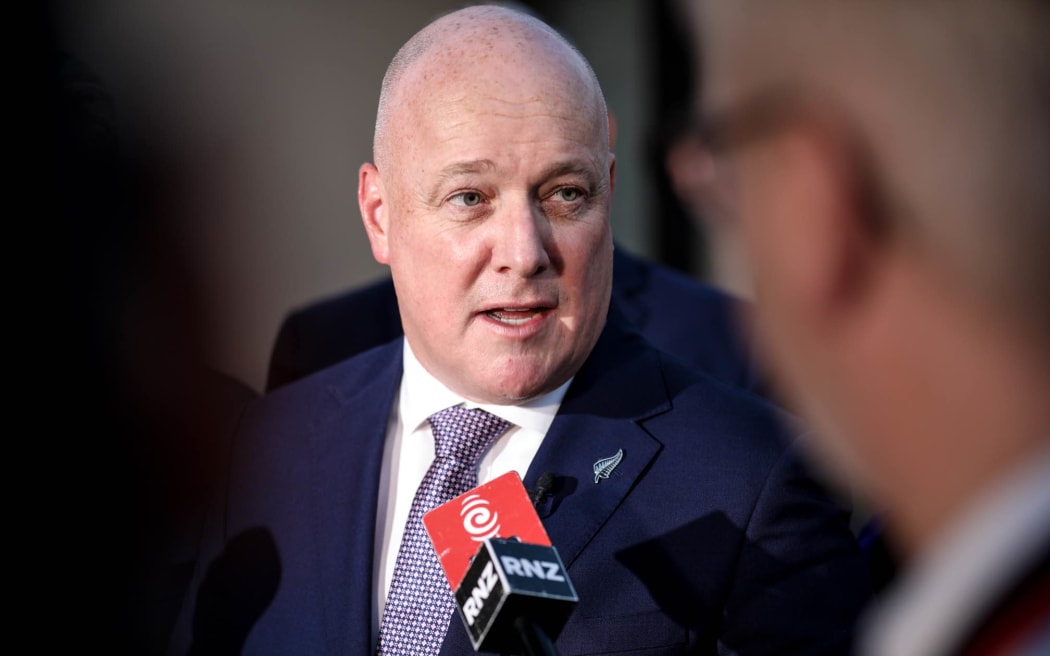
Prime Minister Christopher Luxon says the aim is to have one system with "maximum levels of clarity". File photo. Photo: RNZ / Marika Khabazi
The prime minister says new pay equity legislation announced today could save the government "billions of dollars", just two weeks out from the Budget.
The coalition government announced on Tuesday it would use urgency in Parliament to raise the threshold for proving work has been historically undervalued when making a pay equity claim.
Workplace Relations Minister Brooke van Velden said changes back in 2020 had created problems.
Christopher Luxon told reporters on his way into Question Time that money has been set aside in the Budget to be announced on 22 May to deal with claims under the new legislation, and that those costs would be lower as a result of the changes announced on Tuesday.
He said the costs could be lower by "billions of dollars".
Despite this, Luxon said the Budget was not the motivation for changing the legislation.
"It's got nothing to do with the Budget, this is about making sure we have a piece of legislation that is incredibly workable, and not as complex as it has been."
That was not how Act Party leader and associate finance minister David Seymour viewed it, applauding van Velden for finding such huge savings at a crucial time.
"I actually think that Brooke van Velden has saved the taxpayer billions, she's saved the Budget for the government and she has made pay equity workable for New Zealand women, men and everyone who wants a fair go in this country," he said.
Luxon said rushing the changes through urgency was about making sure there was one system with "maximum levels of clarity".
Under the new legislation, any current claims would be stopped and need to restart under the new threshold to show "genuine" gender discrimination and make sure the comparators were right.
There will be 33 current claims stopped as a result.
Both Luxon and van Velden said they supported pay equity and removing gender-based discrimination.
"Any union can still lay a claim under the new legislation... what we're doing is just making sure the legislation is workable and sustainable," Luxon said.
Seymour did not believe a select committee process was needed because extensive inquiries were done when the legislation first passed in 2017, and he said the coalition was simply returning to that.
"We know how it was, I believe this law is simply returning to what we know works, from what is unfair, unaffordable and unworkable."
He argued the legislation "devolved" over the years and lead to "absorb comparisons where, for example, you were saying someone who was a clerical administrator was like a mechanical engineer".
"Women won't be worse off because of these changes," he said.
The finance minister rejected claims changes to the pay equity system are being made to pay for the government's budget.
Nicola Willis headed to Question Time flanked by female ministers Louise Upston, Judith Collins, Erica Stanford and Nicola Grigg, to defend the government's position on pay equity.
She acknowledged savings would be made due to the changes, but unlike Luxon and Seymour would not say how much.
Willis also ruled out ring-fencing the funding that had been saved in the Budget for programmes and policy that will benefit women.
NZ First leader Winston Peters said his party had always supported a fair go for women in the workforce, and rejected the notion workers were losing out from pay equity changes announced today.
Peters said nothing was being taken away from workers.
"You're going to find better ways to uplift the wage structure for all people in this country, and we've always stood for that, but we've also argued that employers need tax assistance to be able to pay better wages."
Peters rejected claims from Labour and the Greens that women were being thrown under the bus to pay for the government's budget.
Labour leader Chris Hipkins slammed the changes, saying the government getting back into surplus should not be at the expense of women.
He said women had the right to be "absolutely furious".
"Not only have the government kept this under wraps, they're now using parliamentary urgency to take away a women's right to equal pay. That is simply unacceptable."
He said Willis was saying to women up and down the country: "Sorry, but you are the sacrificial lambs who are going to have to pay the price for the government's forthcoming Budget."
The Greens were also scathing, criticising the move to pass the law under urgency, with co-leader Marama Davidson saying the government was being "urgent in their cruelty to women and workers".
She said it was a "disgusting" and "politically violent act" toward women and workers.
"This government is expecting women workers, and the lowest paid women workers, to bear the brunt of their tax cuts for the wealthy."
Both Labour and the Greens said they would reverse the changes.
The Public Service Association union told RNZ about 175,000 people already had their pay corrected, and current claims covered at least 150,000 workers across education, health, tertiary education, local government and public service sectors.
Sign up for Ngā Pitopito Kōrero, a daily newsletter curated by our editors and delivered straight to your inbox every weekday.


